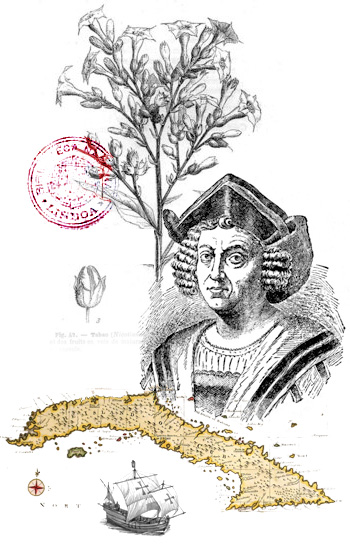The History

History of Cuban Cigars
The tobacco plant, historians concur, came to Cuba from South America somewhere between 3000 and 2000 B.C., where it became an integral part of the cultural life of the island's Indian natives.
Believed to have medicinal qualities, the raw leaves were twisted and smoked for centuries before Columbus sailed to the New World. The cigar's introduction to Europe and the rest of the world would soon follow.
Although royal European leaders, including King Phillip II of Spain, condemned the plant as evil, Cuban tobacco gained popularity. Spain soon realized the commercial value of the plant and, during the late 16th century, began playing a pivotal role in its manufacturing and distribution throughout Europe.
Initially tobacco was only distributed as a raw material through Spanish royal offices, assuring Spaniards an unimpeded flow of tax money. In 1717, King Felipe V cemented the royal monopoly of Cuban tobacco, known simply as the "Tobacco Monopoly," and Cubans were relegated to growing tobacco solely for Spain. During this period, distributing tobacco seeds to a non-Spanish colony was punishable by death.
But cigar cultivation was already deeply rooted in Cuba, resulting in the development of planting, curing and rolling skills that would make Cuban's experts in the field-it's a culture that has defied reproduction elsewhere. Tobacco became Cuba's top agricultural product during the 18th century, quickly permeating Cuban culture and society.
In 1817, King Ferdinand VII issued a royal decree allowing the free trade of tobacco from Cuba to the rest of the world, albeit through Spanish ports. It was the birth of the modern Cuban cigar industry.
Cigar cultivation and production has changed very little since then.
Today a majority of Cuban tobacco is grown in the Pinar del Rio province, in the western section of the island. The singular microclimate and rich soil of this area lends Cuban tobacco its unique flavor, which experts say is the finest in the world.

